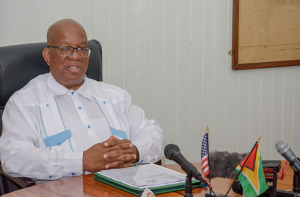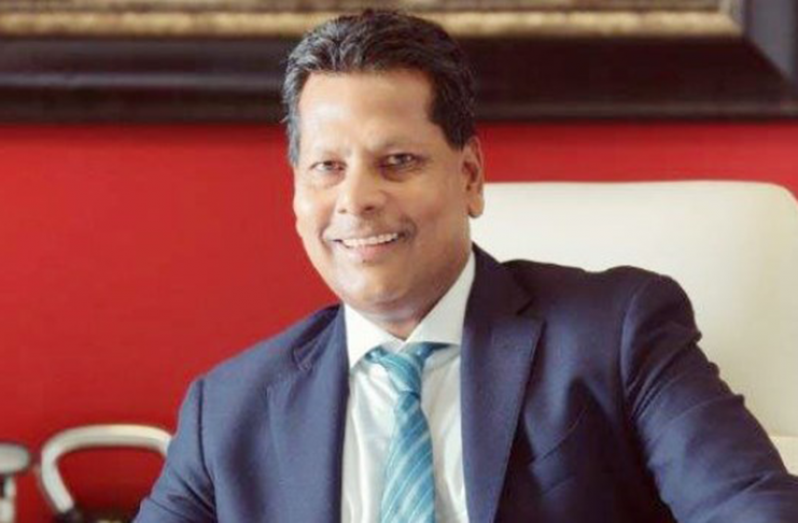…Finance minister says Pegasus owner benefitted from billions in tax concessions
…to soon release full list of all the incentives
By Lisa Hamilton
PRESIDENTIAL Candidate of Change Guyana, Businessman Robert Badal has benefitted from “billions of dollars” in tax incentives although one of his main mantras in his election campaign is the “burden on the taxpayer”.
Very soon, a list of all such concessions will go public, Minister of Finance, Winston Jordan has promised. On Benschop Radio on Tuesday on the topic of concessions, questions were asked in regards to Badal and Jordan did not mince his words. “Mr. Badal has benefitted from billions of dollars of tax incentives. Billions of dollars. In fact, I’m now asking my people to total up how much are these concessions, but I know they run into billions of dollars,” he stated.
QUANTIFY IT
At a recent press conference, Badal, one of Guyana’s newest party leaders, promised to create an effective tax policy to promote economic growth should his party be elected.
“Excessively high taxation has been a feature and consequence of large governments under the PPP and Coalition governments over the past three decades…over that period government transferred hard earned income from the Guyanese people to government coffers with not much to show in terms of development,” he said earlier in November.
However, Jordan said that much of Badal’s remarks on taxes are surface level and fail to examine the intricacies involved. “It seems these days [it is] fashionable that if you don’t get what you ask for in full, then you can go form a party and spout whatever you think you will do. I would like those people who think Mr. Badal is the next [leader] to ask him to quantify –not just talk to say we will lower taxes –quantify what it means and how you are going to replace the lost revenue. Quantify it,” Jordan said.
The failure to provide a plan runs similar to the floating of People’s Progressive Party (PPP) Presidential candidate, Irfaan Ali that, once in power, the party will create 50,000 new jobs.
Ali has failed to provide a satisfactory response to the media on how exactly this would be achieved. At another press conference, the Change Guyana party had promised immediate reduction in Value Added Tax (VAT) from 14 per cent to 12 per cent if elected.
The Finance Minister said: “You can’t just spout these things by sitting down in front of some TV or in your hotel and say ‘oh, we gon do this, we gon do that’ [and] when you get into government, different story.”

Just recently, Jordan had cause to label the cries of the private sector of “heavy taxation” as a “ruse” to hide what is going on in that sector. He advised that persons investigate whether the sector is truly “heavily taxed” as the government has significantly reformed the taxation system in favour of the private sector. Jordan contended that the revenues which government has been getting since 2015, has come from an expanded base and not new taxes on the private sector.
He believes that contrary to what is being said by the private sector, government has done a lot to improve the sector and promote business. The Finance Minister referred to the tax amnesty which was proffered in 2018 to allow taxpayers who had defaulted to sort it out with the Guyana Revenue Authority (GRA). The period of amnesty for taxpayers, both corporate and individual, would ensure that they are able to get in order, the filing of true and correct tax returns and payment of their true and correct taxes.
On the programme, he also spoke on the topic “Tax concessions in other areas. On Monday in a statement, Badal said that Exxon has been “exempted from paying taxes for the life of the project” while the private sector and citizens cannot get the same.
Speaking to the same, Jordan said that while certain entities have been suggesting that there is a disparity in the concessions given to foreigners versus local companies, locals have the opportunity to get the same if they win a contract with the foreign company.
In the case of ExxonMobil — which has dominated certain media entities — he explained that a subsidiary of ExxonMobil is just that and not defined in the Production Sharing Agreement (PSA) as either foreign or local. Explaining further, he stated: “If a local company bids for a contract with Exxon and gets that contract, everything it supplies to Exxon will be in accordance with the PSA because what is given to Exxon must also be given to subsidiaries…once you are a local company and you would have won that bid for Exxon, you can import all [specified materials] for Exxon duty free or tax free in accordance with the PSA.”
He added that Exxon’s investment in the face of high risk cannot be compared to other ventures. “When you look at the investment that Exxon has done, when you look at the risk that Exxon has taken in deep waters and these types of things when nobody wanted to go even though we were giving them all the concessions, how can you compare concessions given to Exxon with not another Guyanese company that is going to drill for oil but some investment in some other place where they already have lights, water, power and all these different [things]?” he questioned.



.jpg)









